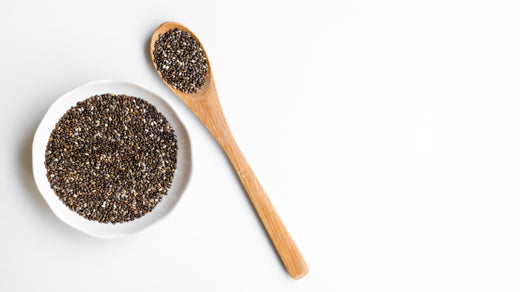The Nutritional Power of Chia Seeds: Is One Teaspoon Enough for Protein?

In the realm of superfoods, chia seeds have gained immense popularity for their impressive nutritional profile and health benefits. If you’ve ever wondered about the protein content in chia seeds and whether one teaspoon is enough to contribute to your daily intake, you’re in the right place. In this blog, we’ll explore the protein content of chia seeds, and their overall health benefits, and answer the question: Are chia seeds good for you?
Understanding Chia Seeds: A Nutritional Overview
Chia seeds are tiny black seeds derived from the Salvia hispanica plant, native to Central America. These seeds are not only rich in protein but also packed with essential nutrients, making them a fantastic addition to any diet.
Protein Content in Chia Seeds
When it comes to protein, chia seeds are a great source, especially for those following a plant-based diet. Here’s a quick breakdown of the protein content:
- 1 teaspoon of chia seeds (approximately 4.5 grams) contains about 0.84 to 1 gram of protein.
- In a larger serving size, such as 1 ounce (28 grams), chia seeds provide around 4.7 grams of protein.
While one teaspoon may not seem like a lot, it can still contribute to your overall protein intake, especially when combined with other protein sources throughout the day.
Are Chia Seeds Good for You?
Now that we’ve established the protein content, let’s delve into the broader question: Are chia seeds good for you? The answer is a resounding yes! Here are some of the key health benefits of incorporating chia seeds into your diet:
-
Rich in Nutrients: Chia seeds are loaded with essential nutrients, including fiber, omega-3 fatty acids, calcium, magnesium, and antioxidants. This nutrient density makes them a valuable addition to any meal.
-
High in Fiber: With about 11 grams of fiber per ounce, chia seeds can help support digestive health. Fiber aids in regular bowel movements and can help you feel fuller for longer, which is beneficial for weight management.
-
Heart Health: The omega-3 fatty acids found in chia seeds can help lower cholesterol levels and reduce the risk of heart disease. They also support healthy blood pressure levels, making them a heart-friendly food.
-
Bone Health: Chia seeds are an excellent source of calcium, magnesium, and phosphorus, all of which are essential for maintaining strong bones and preventing osteoporosis.
-
Blood Sugar Control: The high fiber content in chia seeds can help stabilize blood sugar levels, making them a great option for those with diabetes or anyone looking to maintain steady energy levels throughout the day.
-
Antioxidant Properties: Chia seeds are rich in antioxidants, which help combat oxidative stress and inflammation in the body. This can reduce the risk of chronic diseases and promote overall health.
How to Incorporate Chia Seeds into Your Diet
Chia seeds are incredibly versatile and can be easily added to various dishes. Here are some creative ways to incorporate them into your meals:
-
Chia Pudding: Mix chia seeds with your milk (dairy or plant-based) and let them soak overnight. Add fruits, nuts, or sweeteners in the morning for a delicious breakfast or snack.
-
Smoothies: Add a tablespoon of chia seeds to your favorite smoothie for an extra boost of protein and fiber.
-
Baking: Incorporate chia seeds into your baking recipes, such as muffins, bread, or energy bars, for added nutrition.
-
Salads: Sprinkle chia seeds on top of salads for a crunchy texture and nutritional boost.
-
-
Posted in
1 tbsp chia seeds fiber, chia seed nutrition, chia seeds nutrition facts, chia seeds uses, is chia seed good

Great insights! Thankyou for sharing the benefits of having chia seeds.